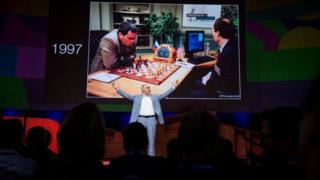 Image copyright
Image copyright
Ted
Garry Kasparov appeared at the Ted conference in Vancouver
Garry Kasparov relived his epic chess match with IBM’s Deep Blue computer as he took to the stage at the Ted (Technology, Entertainment and Design) conference to talk about the current battle between man and machine.
The ex-champion said it had been both a “blessing and curse” to be the first to take on an intelligent machine.
“Nobody remembers that I won the first match,” he said.
And he still believed man had ultimately triumphed.
“Machine’s triumph is man’s triumph,” he told the audience.
“Deep Blue was victorious, but was it intelligent?
“Chess could be crunched by brute force once algorithms got smart enough, but it didn’t offer the dreamt-of insights into the mysteries of human intelligence.”
Image copyright
Getty Images
What can a game of chess teach us about our machine future?
He described how he had felt when he had sat down for his first match, in February 1996.
“When I met Deep Blue I was the world champion, but I immediately sensed something new, something unsettling,” Kasparov said.
“I wasn’t sure what the thing was capable of.”
Now we faced similar challenges in our everyday life, he said.
“Soon machines will be taxi drivers and doctors, but will they be intelligent?” Kasparov asked.
“What really matters is how humans feel about working and living with these machines.”
Since Kasparov’s match, machines have taken on far more complex challenges, with Google’s DeepMind recently proving successful in the game of Go.
Smart machines are increasingly being integrated into all aspects of society – self-drive vehicles are being tested in cities around the world and artificial intelligence systems currently work alongside humans in a range of professions, including doctors, lawyers and insurers.
Garry Kasparov was the number one ranked chess player when he lost to Deep Blue
“Eventually every profession will have to feel this pressure or else it will mean humanity has failed to progress,” Kasparov told the Ted audience.
“We don’t get to choose when progress starts, and we cannot slow it down.
“Technology excels at removing difficulties and uncertainties from our lives.
“We must seek out ever more complicated challenges.”
And this has led some to consider whether the future leaves any room for humans.
When Deep Blue triumphed, Kasparov said, he had wondered whether it would signal the end of “my beloved game”, but he had concluded it would not.
“The world of chess still wanted a human world champion,” he said, adding chess apps more powerful than Deep Blue were now available on phones but people still chose to play each other.
He said society should not let fears of what technology might eventually be capable of affect the drive to make it ever-more powerful.
Human passion
“We need to conquer those fears if we want to get the best out of humanity,” he said.
He pointed out that machines remained far from perfect – using the example of online translation, which often requires a good deal of human input to get an accurate result.
While his historic match with Deep Blue had come to define a “man v machine battle”, he said, it was important to focus on the differences between the two.
“Machines have instructions, we have purpose,” Kasparov said.
“Machines have objectivity, we have passion.
“We should not worry about what machines can do today, we should worry about what they cannot do.
“If we fail, it is because we grew complacent and limited our ambitions.
“There is one thing only humans can do, and that is dream.”
Ted 2017: I won first match with Deep Blue, says Kasparov

